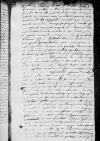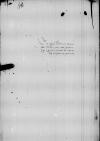Letter #2064
Ioannes DANTISCUS to Tiedemann GIESEWartenburg, 1539-01-27
English register:
Dantiscus informs Giese about the many letters from Cracow he received the day before. Contrary to expectations, he did not find in them any mention of the matter of storing the tax money. He supposes the reason is the preliminary consent to put it off until the next Diet [of Royal Prussia]. However, this consent is conditional on the [Prussian] lords’ letter reaching the [royal] court in time.
Dantiscus complains about the stance of most of the Prussian Council, and especially the Thorn (Toruń) Town Council and the Pomeranian Voivode [Jerzy Konopacki (Georg von Konopat)], who is saying publicly that he knew nothing of the memorandum sent to the court from the Graudenz (Grudziądz) Diet.
Dantiscus is putting off discussing many other issues until he and the addressee meet in person.
Dantiscus believes [Prussian] affairs are not going well. At the ongoing [Crown] Diet in Cracow, they are working on burdening the residents of [Royal] Prussia with new costs and making them equal in everything to the residents of the Kingdom [of Poland].
Fabian Wojanowski (Damerau), who arrived recently, has given Dantiscus a reply from the Queen [Bona Sforza] who, as before, considers him responsible for everything that is going on in Prussia and accuses him of getting a message written to the King [Sigismund I Jagiellon] from the [Royal Prussian] Diet without the others’ consent. According to the Queen, no one [in Royal Prussia] besides the Voivode of Pomerania and the [Starost] of Strasburg in Preusen (Brodnica) [Mikołaj Działyński] shows any concern for royal interests and authority. However, Dantiscus has received a message, written on the King’s behalf, not to take these opinions to heart.
Following the majority’s example, Dantiscus intends to send the tax money to Marienburg (Malbork) soon, and advises others to do the same. He thinks, however, that the [Prussian] lords should describe the whole matter to the King, asking that he order the next Diet to take a serious approach to the settlement of accounts, thanks to which it will be clear how much has been paid by whom, and it will be possible to ease the conflicts between the nobility and the burghers over beer brewing.
Dantiscus reports that a decision was made at the Cracow Diet of the Kingdom [of Poland] regarding defence against the Turks. The costs are also to be borne by the clergy and residents of [Royal] Prussia from both estates.
Having read Giese’s latest letter, Dantiscus advises him not to write to the King on behalf of the Prussian lords, because he will incur the court’s displeasure. In his view, the letter needs to be written anew in accordance with the advice of the Castellan of Gdańsk (Danzig) [Achatius von Zehmen (Cema)], and the towns should be notified of it as quickly as possible. The money already collected should be sent to Marienburg immediately. The blame for this state of affairs lies solely with the Voivode of Pomerania.
Manuscript sources:
Prints:
| ||||||||||
Text & apparatus & commentary Plain text Text & commentary Text & apparatus
Reverendissimo in Christo Patri et Domino, domino
Reverendissime in Christo Pater et Domine, frater et amice carissime et honoran(de) or honoran(dissime)⌈honoran(de)honoran(de) or honoran(dissime)⌉.
Salutem et fraterni amoris commendationem etc.
Pridie cf.
Hic multa omitto usque ad nostrum aliquando colloquium.
Res nostrae certe inclinant. Quare et nunc in
Venit praeterea ad me dominus
Ceterum, cum videam maiorem ordinum nostrorum partem pecuniam collectam  BCz, 245, p. 116 saltem pro nobis egisse videamur), quin serenissimae
BCz, 245, p. 116 saltem pro nobis egisse videamur), quin serenissimae
ms 1 quide[...] hidden by binding⌈quidemms 2 quidem,
ms 1 quide[...] hidden by binding⌉ deinceps licebit etc.
Quae
ms 1 [...]untur hidden by binding⌈agunturms 2 aguntur,
ms 1 [...]untur hidden by binding⌉, sic habent in summa: proposita est ms 2 defensio,
ms 1 defe[n]sio hidden by binding⌈defensioms 2 defensio,
ms 1 defe[n]sio hidden by binding⌉ contra
Quam felicissime diutissimeque valere cupio ex animo.
Dat(ae) or Dat(um)⌈Dat(ae)Dat(ae) or Dat(um)⌉
Reverendissimae Dominationis Vestrae deditissimus frater
Postscript:
 BCz, 245, p. 1 not numbered after f. 148 (f. 80r according to previous foliation)
BCz, 245, p. 1 not numbered after f. 148 (f. 80r according to previous foliation)
Postquam
ms 2 non⌈iamms 1 iam,
ms 2 non⌉ collectam, cum iam maior eius pars sit in



